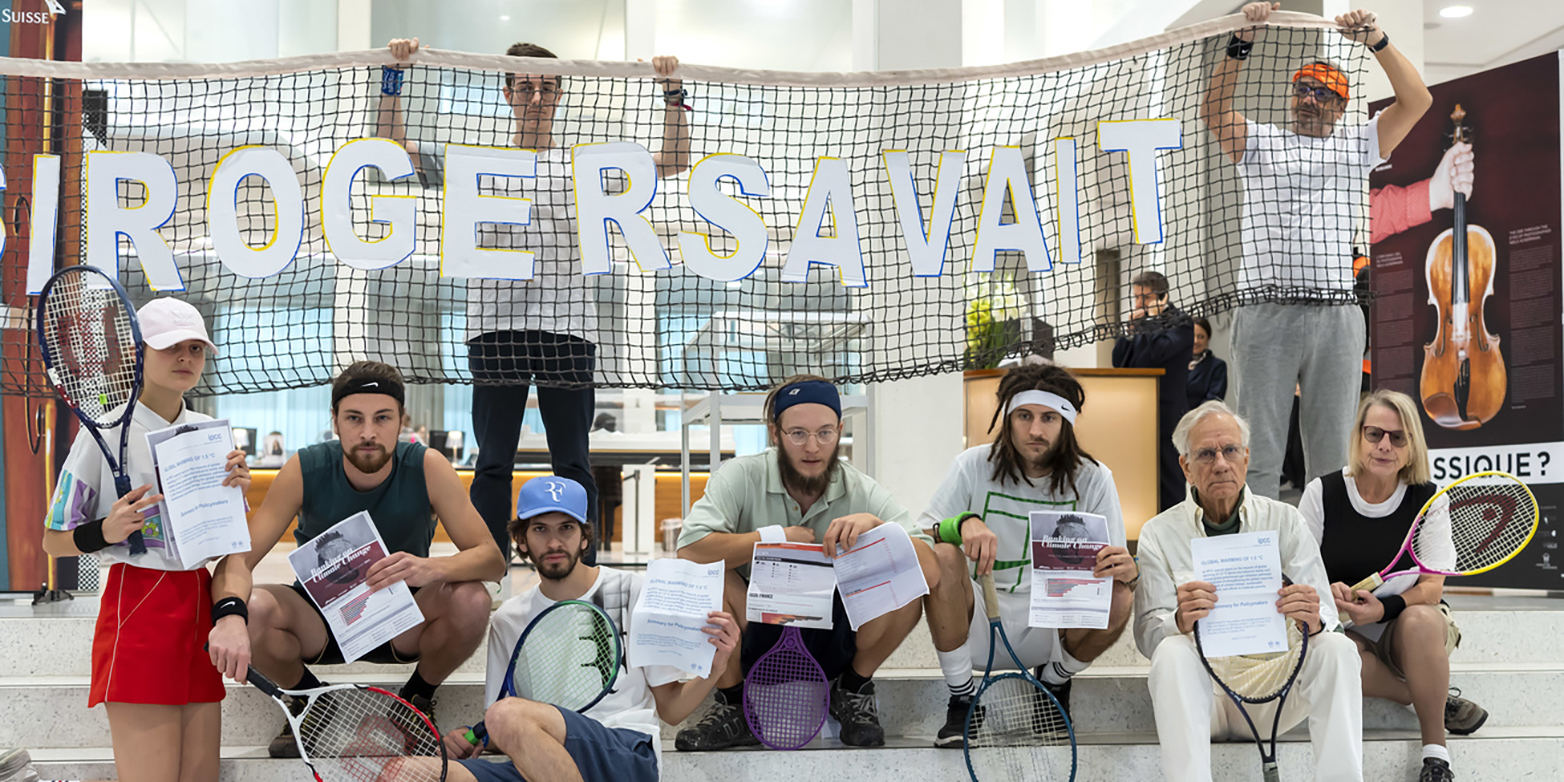Yes, we're worried
Climate activists were sentenced yesterday in the second instance. Sonia Seneviratne explains why climate researchers got involved in this trial and expressed their views in a public statement.
In January, a verdict of the district court in Renens, close to Lausanne, led to a worldwide sensation: it acquitted 12 climate activists who had staged tennis matches in a Credit Suisse branch in November 2018. Their illegal but non-violent action alluded to the tennis icon Roger Federer who is sponsored by the major bank. The activists wanted to draw attention to the fact that Credit Suisse had continued to make substantial fossil fuels investments1 after the Paris agreement was adopted in December 2015, and that in so doing had exacerbated the climate crisis. In the first hearing, 13 lawyers defended the activists pro bono, arguing that they had acted out of a “state of necessity” (état de nécessité), namely an emergency situation in which a person is forced to break the law to protect a higher good.

I experienced that trial first-hand – as one of two scientific expert witnesses that were invited to testify. In this capacity, I answered questions for over an hour on the IPCC special report on global warming of 1.5°C, on which I had been a lead author2. I noted that the single judge paid close attention to my testimony, and, in pronouncing his verdict, mentioned that this testimony and the evidence from the IPCC report had convinced the court (“ont emporté la conviction du tribunal”).
The prosecutor for the canton of Vaud, who didn’t attend the first trial, however, was not convinced. In his view, no such state of necessity could be invoked in this case. So he appealed. Interestingly, he based his appeal on one of my statements, namely that I wasn’t saying that nothing is happening at all, as there are also some positive developments. This was of course very selective, because elsewhere I made it very clear that too little progress has been made since the Paris Agreement was adopted, and that the progress mentioned was by no means in line with what had been agreed.
Broader scope of the process
The case was heard this week in second instance at the Vaud Cantonal Court, and the verdict announced yesterday: the climate activists were sentenced to fines, partially on probation. The verdict may well be reviewed at the Federal Supreme Court in a few months. In the view of the defence lawyers, scientific evidence was crucial to this appeal process. However, no scientific witness was allowed. The lawyers therefore addressed a series of questions to me and other scientists, asking us to answer them in writing so that they could be shared in court.
As a team of eight scientists, we wrote a statement3 summarising once again the state of climate science and the urgency of responding to climate change. The further authors included Thomas Stocker, professor at the University of Bern and former co-chair of the IPCC Working Group 1. A number of Swiss and international climate experts co-signed the statement, including several of my colleagues at ETH Zurich (David Bresch, Andreas Fischlin, Nicolas Gruber, Reto Knutti, Christoph Schär and Heini Wernli). In all, the document was co-signed by 21 climate researchers.
“Let’s hope that trials like this will generate social discourse on the urgency of climate action.”Sonia Seneviratne
By cooperating with the defence, we may give the impression that we’ve taken sides in this trial. I’m aware of this. But this trial was about more than just the legal clarification of an illegal action. Whether such actions can be justified by referring to the urgency of climate policy action is a matter on which the courts must rule, and on which I don’t wish to comment here.
Importantly, the trial also dealt with the extent to which the climate crisis poses an imminent danger, tantamount to an emergency. As climate scientists, it was essential for us to provide the court with our expertise in this unprecedented case. For just how serious the situation is at present is something that climate science must evaluate. And, in its verdict yesterday, the court recognised this: climate change is an imminent threat.
Gap between commitment and willingness
So, are we as climate scientists worried? Yes, we are. We can all see the global warming that climate scientists have anticipated for decades4. Since the Paris agreement of 2015, and in spite of it, there have been no major reductions in global CO2 emissions and no substantial progress achieved in resolving the climate crisis. On the contrary, the concentration of CO2 in the atmosphere has continued to increase, while the buffer for limiting warming to 1.5°C is dwindling away. Meanwhile, the risks of severe and irreversible climate impacts are increasing. Above all, we can’t ignore the gap between the commitments made in the Paris agreement and the capacity and willingness of decision-makers to actually implement them. And this worries us all the more.
Many people, especially the young, believe that the voice of science is not listened to enough and are taking action to draw attention to this. Let’s hope that trials like this will generate social discourse on the urgency of climate action.
References
1 external page Swissinfo: Banks accused of massive fossil fuel investments
2 Sonia Seneviratne in the Zukunftsblog: “Gletscher-Initiative”: Setting course towards 1.5°C
3 Download Public statement from climate researchers
Comments
No comments yet